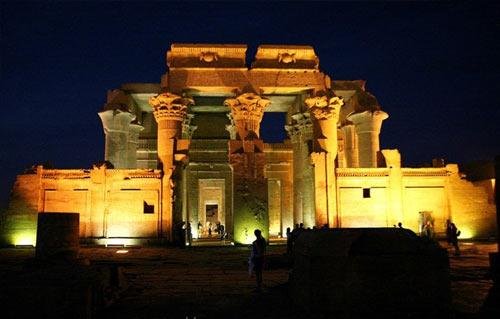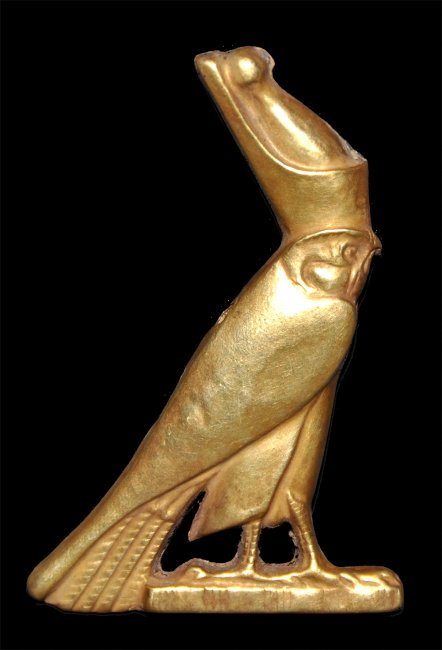.jpg)
Horus is the god of good and justice in the ancient Egyptians.
The construction of the monumental Temple of Horus began during the reign of Ptolemy III - Ioregites I (Ptolemy III Euergetes I) in 237 BC. The construction of this temple took about 200 years.

It was founded during the reign of Ptolemy XIII in the first century BC.
His name is in the ancient Egyptian language "free", or "Hor", and Greek "Horus", and this last name is mentioned in references Egyptology. He is one of the most important and oldest Egyptian idolaters ever since, and has been associated since his appearance with the monarchy and legitimacy of the government, as the heir to his father, "Ausir". Therefore, the king was considered a "hoor" on the ground, or his representative on the throne of Egypt, an actual or symbolic representation. [1]
The texts of the stone ("Palermo") to the pre-Egyptian kings in Egypt that they were known as "Chamusio Hor", ie: (followers of Hor). The idol "Hor" appeared in many images, and his theology expresses that he is one of the most profound Egyptian gods in ancient Egyptian theology.
His name appeared on the archaeological sources since the beginning of the families, and the "Hor" is the first Egyptian idol in the form of the falcon, where the body in this body on the prayer of King "Narmer" and restricts the prisoners.

 .
.
Horus was mentioned in one of the famous legends of ancient Egypt and was considered a symbol of good and justice. Osiris, the god of the Baath and the aristocrat of the Egyptians, was killed by his evil brother, six, the symbol of evil. His mother was the one who gathered his father after his uncle and his father joined him. His mother Isis was the goddess of the moon. According to the religious legend, his uncle the wicked six killed his father and distributed parts throughout the country. His mother, Isis, gathered all the parts of his father's body, and this was the first process to mummify the dead and the body of his father. Horus was later born and wanted to avenge his uncle and take vengeance for his father, so Horus is sometimes called "protector of his father". Horus lost in that battle his left eye. And took the throne of Egypt.
Osiris became the god of calculation in the afterlife, and Horus became the king of this life. Each of the kings of Egypt was ruled by the representative of Horus, and uses the god Horus in the works and wars. Therefore, we find all the kings of Egypt characterized in one of their names (and the king usually has 5 titles) in the name of Horus.
.jpg)
.jpg)
 .
.
Egypt was united under one royal crown at the initiative of one of the kings of Hierakonpolis in the Upper Egypt, whose guardian god was the goddess Horus. He was united with the king of Upper Egypt, who, in addition to his personal name Horus, God.
.jpg) .
.
Thus, Horus, the god of the victors, and also the god of the new unified state. It seems that this political unification was carried out with the substantial help of other Upper Egypt cities and territories such as the Ambos and Khomoun (Hermopolis or Ashmonin) because their Temples and Thoth respectively had their important place later in the unified Kingdom era. ), Who was always considered one of the supreme worshipers, while the god (six) named him the "master of Upper Egypt" and became a rival to Horus himself, so much so that the king had long considered the family as the embodiment of both Horus and West. (Horus) since the king (Khaskhemui Khasekhemui) of the second family is (Horus - six), which was carried by the king and ordered It was engraved even on one of the granite doors in the Temple of God (Horus) in Herakonpolis. At a historical moment, the sixth was a decisive victory over Horus when the king, Only then did the subsequent return of the following kings to the name Horus once again prove that this superiority was not merely a temporary distinction, and it seems that this early competition between Horus and West was the historical basis in the introduction of the myth of Osiris and Horus as a rival and enemy For them.
Egyptian scientists are still not in agreement to identify the original home of the god (Horus). While some consider it to be one of the gods that had many nodal centers in prehistoric times in various parts of Upper and Lower Egypt, the center of Horus in Upper Egypt is what can be considered as the origin of the royal doctrine of Horus in historical times, The other explains the archaeological evidence for a different interpretation, which they believe indicates a kingdom of the maritime face sometime in prehistoric times
Good work
thank you for suuporting me